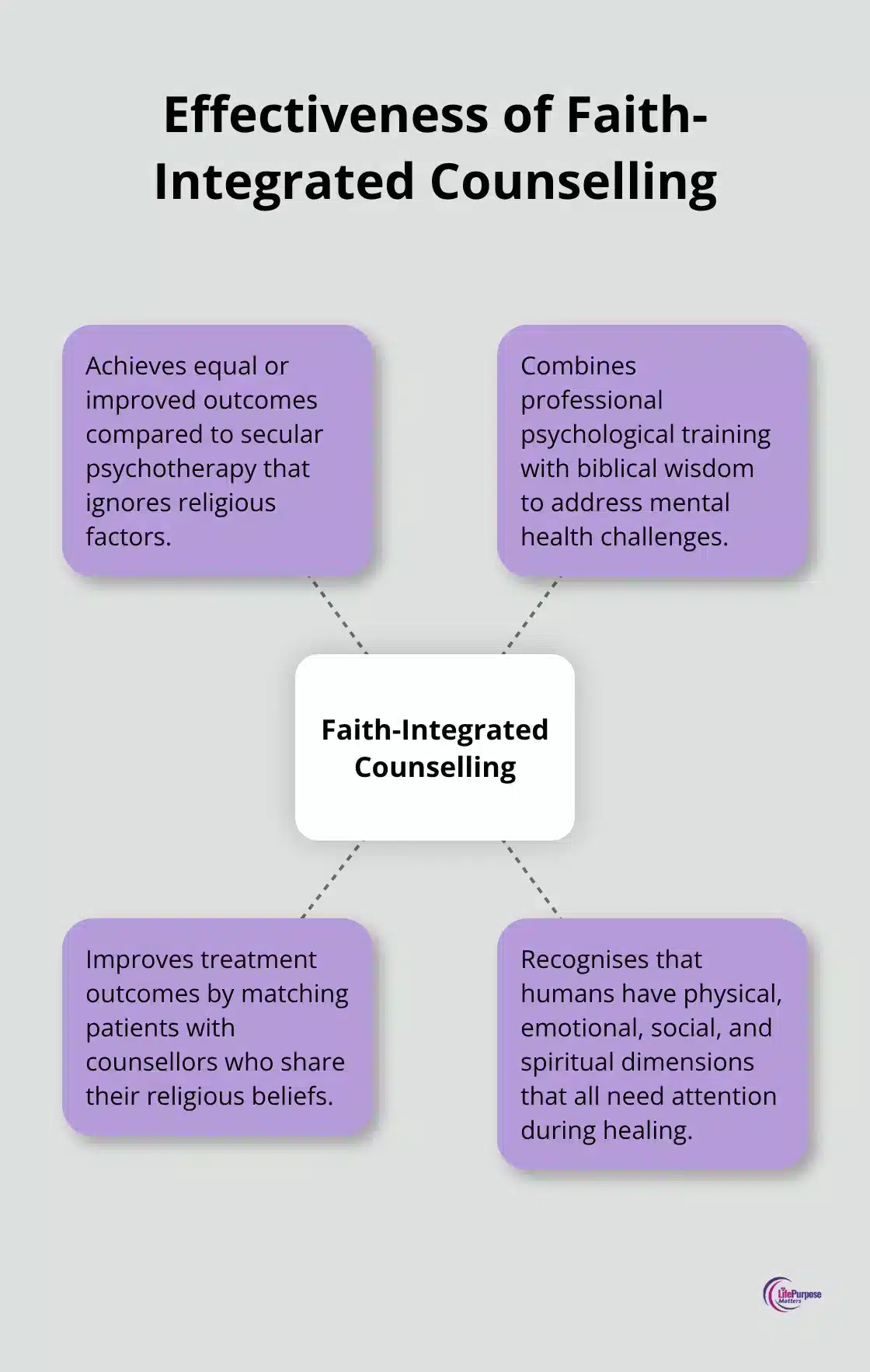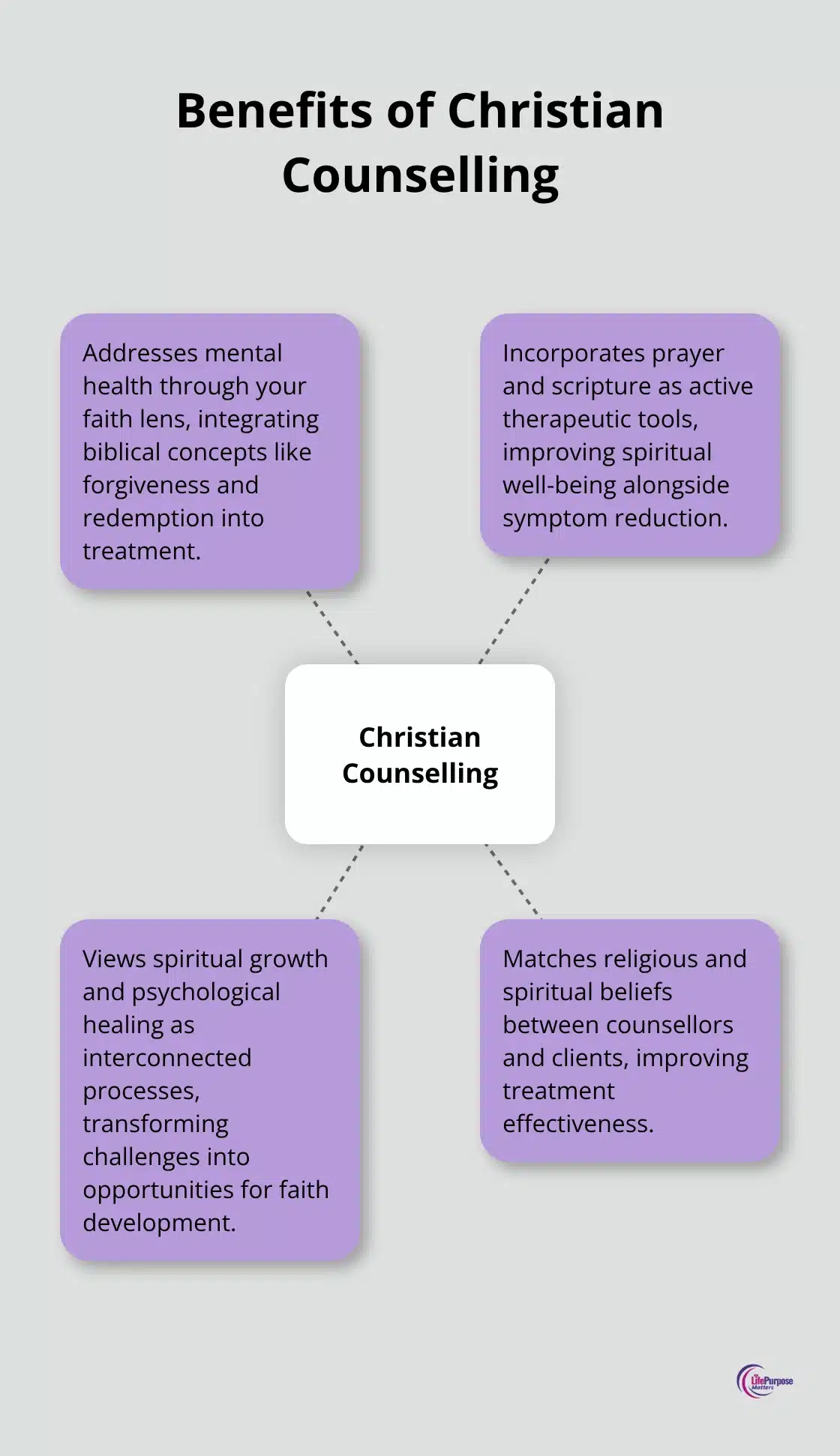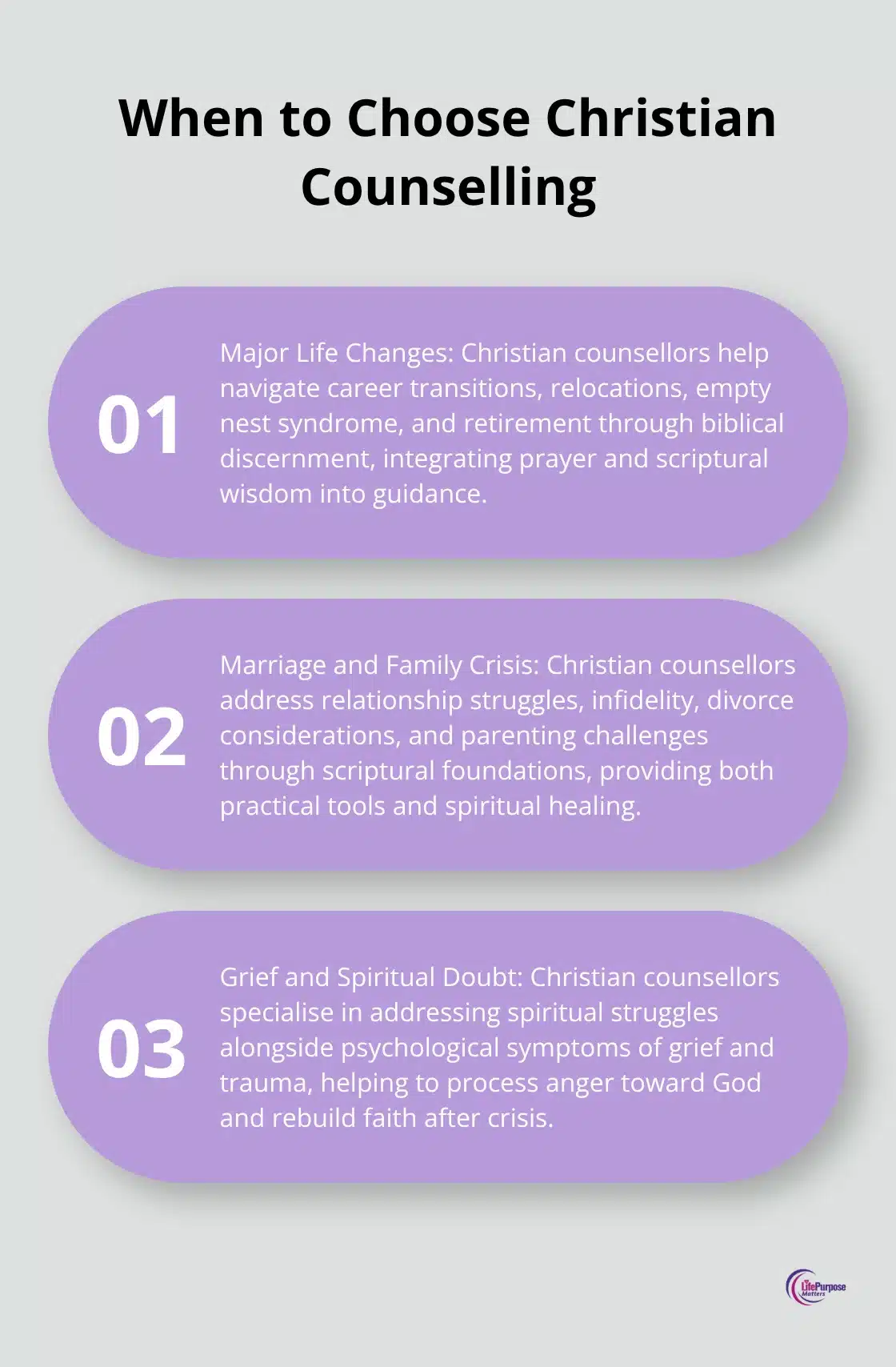Liz sat in her car outside the therapist’s office, wondering if she’d made the right decision. She wanted professional help for her anxiety, but would a secular therapist understand her faith? Many Christians face this same dilemma when seeking mental health support. Christian counselling offers a unique approach that honours both psychological expertise and spiritual beliefs. We live in a world where no one is immune to mental health challenges; it can happen to anyone at any time, Christian or not! With that said, seeking mental health help is important for Christians because it honours the body God created, allows for deeper healing, and aligns with biblical principles of seeking wisdom and support – Proverbs 13:20. It can provide a safe space to process struggles, equip you with tools for resilience, and clarify your spiritual journey by addressing barriers that hinder you from living the life God intended for you and strengthening your relationship with Him.
Table of Contents
ToggleWe at Life Purpose Matters believe this integration can provide powerful healing for those who want their faith included in their therapeutic journey.
What Makes Christian Counselling Different
Christian counselling combines professional psychological training with biblical wisdom to address mental health challenges. This approach recognises that humans have physical, emotional, social, and spiritual dimensions that all need attention during healing. Research shows that religiously accommodated treatments achieve equal or improved outcomes compared with psychotherapy that pays no attention to religious factors.
Professional Training Meets Biblical Truth
Licensed Christian counsellors hold the same degrees and certifications as secular therapists but integrate scripture and prayer into their practice. The American Association of Christian Counsellors requires members to complete extensive training in both psychological methods and theological studies. These professionals understand cognitive behavioural therapy and trauma treatment while also recognising how sin affects every aspect of life. Studies indicate that matching patients with counsellors who share their religious beliefs improves treatment outcomes.

Beyond Pastoral Care
Christian counselling differs significantly from pastoral care or spiritual direction. Licensed Christian counsellors can diagnose mental health conditions, develop treatment plans, and provide evidence-based interventions. Pastors offer spiritual guidance and biblical counsel but typically lack clinical training to address complex psychological issues like severe depression or anxiety disorders. Christian counsellors bridge this gap by addressing both spiritual struggles and mental health symptoms through professional therapeutic techniques rooted in biblical principles.
The Holistic Approach
This comprehensive method considers all four dimensions of human experience rather than focusing solely on symptoms. Christian counsellors examine how past trauma, social relationships, physical health, and spiritual struggles interconnect to create current challenges. They avoid quick scripture-based solutions and instead practise careful listening to understand each person’s unique circumstances. This patient approach recognises that sanctification and healing take time (often months or years) and require sustained commitment from both counsellor and client.
The question becomes: when might this faith-integrated approach benefit you most?
Why Choose Christian Counselling
Christian counselling offers distinct advantages that secular therapy cannot provide. Meta-analysis research comparing religion and spiritually-based therapy to non-religious treatments shows these faith-integrated approaches can be effective for mental health treatment. The American Psychological Association’s task force rates religious and spiritual matching between counsellors and clients as having high strength of support for improved treatment effectiveness.
Mental Health Through Your Faith Lens
Christian counselling addresses anxiety, depression, and trauma without requiring you to compartmentalise your beliefs. Research indicates that explicitly Christian approaches improve spiritual outcomes compared to secular therapies. Your counsellor understands how biblical concepts like forgiveness, redemption, and God’s sovereignty apply to mental health recovery. This integration prevents the internal conflict many Christians experience when secular therapists challenge their core beliefs or suggest solutions that contradict scripture.
Scripture as a Therapeutic Tool
Christian counsellors incorporate prayer and biblical principles as active treatment components rather than dismiss them as secondary concerns. Studies show that clients who receive religiously tailored treatments report significant improvements in spiritual well-being alongside symptom reduction. Your sessions might include exploration of how Psalm 23 addresses anxiety or how Romans 8:28 reframes traumatic experiences. This approach provides hope rooted in eternal truth rather than temporary positive thinking techniques.
Faith Growth During Crisis
Christian counselling views spiritual growth and psychological healing as interconnected processes. Research demonstrates that religion and spiritually-based therapy can be effective compared to non-religious treatments. Your counsellor helps you see struggles through the lens of sanctification rather than pathology alone. This perspective transforms mental health challenges into opportunities for deeper faith development and spiritual maturity.

These benefits make Christian counselling particularly valuable during specific life circumstances and challenges.
When Should You Choose Christian Counselling
Christian counselling becomes most valuable during three specific life situations where secular therapy falls short of addressing your complete needs. Research shows that religiously accommodated treatments can be effective for those seeking faith-integrated approaches, which makes the timing of your decision strategically important for maximum benefit.

Major Life Changes
Career transitions, relocations, empty nest syndrome, and retirement trigger deep questions about God’s calling and purpose that secular counsellors cannot address adequately. Christian counsellors help you navigate these changes through biblical discernment rather than purely practical decision-making frameworks. They integrate prayer and scriptural wisdom into career guidance and help you evaluate opportunities against God’s will for your life. Studies indicate that clients with high religious commitment report greater closeness with their therapists and greater improvement during these pivotal moments.
Marriage and Family Crisis
Relationship struggles require more than communication techniques when biblical principles guide your marriage covenant. Christian counsellors address infidelity, divorce considerations, parenting challenges, and family conflict through scriptural foundations that secular therapists often cannot provide. They help couples understand marriage as God designed it while they apply evidence-based interventions for relationship repair. Research shows that faith-integrated approaches particularly benefit couples who share Christian values and provide both practical tools and spiritual healing that strengthens marriages long-term.
Grief and Spiritual Doubt
Loss of loved ones, serious illness, job termination, or traumatic experiences often trigger profound questions about God’s goodness and plan. Christian counsellors specialise in how they address these spiritual struggles alongside psychological symptoms of grief and trauma. They help you process anger toward God, understand suffering through biblical theology, and rebuild faith after crisis without dismissal of your spiritual concerns as secondary issues. Research demonstrates that religious treatments improve spiritual outcomes significantly compared to secular approaches, making Christian counselling essential when grief intersects with faith questions. Through developing the fruits of the Spirit during difficult seasons, you can experience transformation that purely secular approaches cannot provide.
Final Thoughts
The right choice for a Christian with a mental health challenge depends on their personal needs: a Christian counsellor may be a better fit if incorporating faith, prayer, and a biblical worldview is important to you. A secular therapist might be preferred if the individual wants to focus purely on evidence-based psychological tools, as a secular therapist will not incorporate religious beliefs unless the client specifically brings them up. Both approaches can be effective, and some Christian counsellors integrate secular psychology, while secular therapists can still be open to discussing faith if the client initiates it.
However, Christian counselling provides a powerful combination of professional mental health treatment and biblical wisdom that secular therapy cannot match. Research consistently shows that faith-integrated approaches achieve equal or better outcomes than traditional methods while they strengthen your spiritual foundation during healing. This approach addresses your complete person rather than symptoms alone.
You need to check professional credentials and theological training when you search for the right Christian counsellor. Look for licensed therapists who are members of the Association of Christians in Counselling (UK) or the American Association of Christian Counsellors and share your denominational beliefs. Ask potential counsellors how they integrate scripture and prayer into sessions and whether they view mental health challenges through a biblical worldview.
This step requires courage, but God honours your commitment to healing within your faith framework. We at Life Purpose Matters believe everyone has a unique purpose that can be explored through supportive Christian guidance. Your mental health journey becomes part of your spiritual growth when you choose counsellors who understand both psychological science and biblical truth (seeking help demonstrates wisdom, not weakness).

